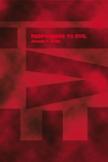A Force to Reckon With
In this brief but compelling little book, Joseph Kelly, professor of religious studies at John Carroll University in Cleveland, Ohio, offers a thoughtful contemporary theodicy for young Christians. Framed as a meditation on the events of Sept. 11, 2001, the book marshals Kelly’s wide knowledge of the history of the problem of evil in Western thought, together with exegesis (Job and the Gospel of Luke), literary analysis and relevant sociological and psychological commentary to reflect on the issue of moral evil.
He probes the question What does evil do to us? by surveying the tradition from the Adam and Eve story of Genesis 2-3, through Augustine’s famous tale in the Confessions about his boyhood theft of pears through Dante’s Divine Comedy and Milton’s Paradise Lost. In the course of the discussion, Kelly presents a cogent interpretation of myth, the pluralism of creation stories and the wisdom that these can provide today.
While Kelly does not overlook the traditional answers suggested by philosophy and theology (especially those of Karl Rahner), he concentrates on literary perspectives, including the Faust stories (by Christopher Marlowe and Goethe), Mary Shelley’s Frankenstein and Robert Louis Stevenson’s Dr. Jekyll and Mr. Hyde to make his point that evil is a form of pride, of putting oneself first.
In addition to examining Holocaust narratives like Elie Wiesel’s Night and the Oklahoma City memorial entitled And Jesus Wept, the author provides a powerful discussion of Flannery O’Connor’s story The Lame Shall Enter First as a telling rendition of the twisted and hypocritical shapes that evil assumes in the contemporary setting.
Throughout the book, Kelly engages the theme of parenthood, drawing on his own experience as a father and his work in parish religious education, to develop an idea of God that addresses the question of how it is that a good God can permit human suffering. He deals with various definitions of evil, pointing out the shortcomings of several approaches. While Kelly acknowledges the significance of natural evil (like hurricanes, floods and fires), he focuses in this book on the deliberative factor that is involved in premeditated moral choice, those choices that involve human intention. As the Apostle Paul wrote in the Letter to the Romans (7:18-19): I can will what is right, but I cannot do it. For I do not do the good I want, but the evil I do not want is what I do.
My only disappointment is that Kelly failed to include, in his short bibliography, Paul Ricoeur’s Symbolism of Evil (Beacon), in which the analysis of the Adam story never fails to provide students with a penetrating and provocative interpretation of the familiar biblical tale.
This article also appeared in print, under the headline “A Force to Reckon With,” in the January 5, 2004, issue.









